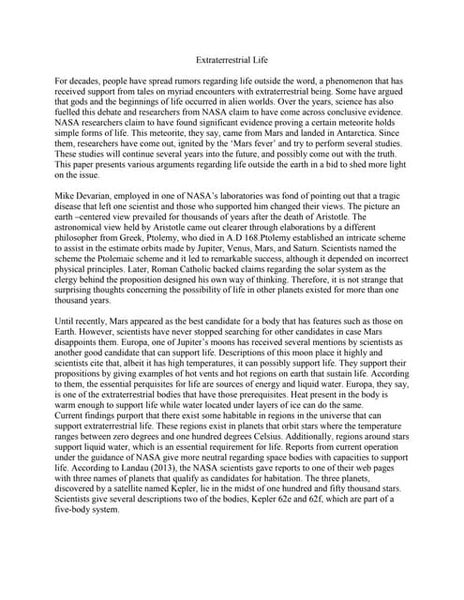Throughout the annals of human contemplation, the notion of extraterrestrial life has captivated both artists and scholars. This fascination is not merely rooted in speculative fiction but also emerges from humanity’s innate desire to understand its place within the vast cosmos. As scientific advancements continue to unveil the mysteries of the universe, one might ponder the philosophical implications of life beyond Earth. The Bahá’í Faith, a relatively modern spiritual tradition, provides insightful perspectives on this topic, specifically through the lens of its sacred writings.
The Bahá’í teachings assert the principle of the unity of all creation. This extends beyond terrestrial existence to include the myriad forms of life that may inhabit the cosmos. Abdu’l-Bahá, a central figure in the Bahá’í Faith, elucidates that the universe is not a random assemblage of celestial bodies but rather a well-ordered system that reflects the divine will. It stands to reason that if our planet teems with life, other realms might equally be home to diverse beings, each fulfilling its own purpose in accordance with divine design.
One of the most compelling aspects of Bahá’í teachings is the acknowledgment of a universal reality—one that transcends national, racial, and religious boundaries. This perspective encourages individuals to entertain the possibility of life on other planets, suggesting that such existence, though perhaps vastly different in form and function, represents the same divine creativity that animates Earthly species. In this context, the exploration of other planets isn’t merely an empirical pursuit but a spiritual inquiry into the nature of reality itself.
The concept of life on other planets invokes deeper existential questions: What is the purpose of life? How do different forms of consciousness contribute to the overall tapestry of existence? The Bahá’í Faith posits that all life is a manifestation of God’s attributes, and this assertion implies that extraterrestrial beings, should they exist, would also be a reflection of divine characteristics. Such a view fosters an enriched appreciation for diversity, prompting us to cultivate a sense of curiosity and reverence for life in all its manifestations.
Bahá’í writings invite believers to ponder the implications of divine unity as they relate to interplanetary existence. The interconnectedness of all beings suggests that, irrespective of whether life exists elsewhere, every creature on our planet is part of an intricate web of existence. By recognizing our shared dependence on a common creator, we may cultivate a more profound sense of empathy towards all living beings, fostering respect for ecosystems and an understanding of our responsibilities as stewards of the Earth.
Furthermore, Bahá’í theology promotes the idea that the universe is continually evolving. The writings articulate that creation is not static but instead speaks to a dynamic process guided by divine wisdom. Such an understanding raises intriguing questions about the evolution of life forms on other planets. Could it be that extraterrestrial civilizations are on different trajectories of development, perhaps achieving varying degrees of awareness or spiritual insight? The Bahá’í concept of progressive revelation suggests that just as humanity receives divine guidance through successive manifestations of God, other worlds may also experience similar epiphanies tailored to their own contexts and circumstances.
The inquiry into extraterrestrial life can also be seen as a reflection of the broader quest for truth within the Bahá’í paradigm. The philosophy encourages an open-minded approach to exploring the unknown, urging adherents to investigate the nature of existence rigorously. This involves a harmonious interplay of reason and faith, where logical inquiry complements spiritual understanding. The Bahá’í Faith encourages rigorous investigation and promotes dialogue on matters of cosmic significance—inviting individuals to explore and evaluate the implications of cosmic life in tandem with their spiritual journeys.
However, it is essential to approach these contemplations with humility. The quest for knowledge about life on other planets, while invigorating, might also compel us to confront our limitations in understanding the vastness of creation. The Bahá’í teachings warn against the arrogance that may arise from our scientific pursuits, reminding us that ultimate knowledge rests with the Creator. Engaging with the divine through prayer and reflection fortifies our connection to the greater universal narrative.
Moreover, the fascination with extraterrestrial life intertwines with humanity’s broader quest for meaning and belonging. Many feel isolated in a universe that seems at once wondrous yet overwhelmingly vast. Bahá’í teachings remind us of a unifying principle—that all creatures, irrespective of their origins, are connected by the same divine source. Thus, even in contemplating life beyond Earth, the search culminates in a deeper understanding of our own role within the universe. This recognition encourages an exploration of deeper values such as love, compassion, and unity—principles that are essential, regardless of the context in which life is found.
In summation, the Bahá’í teachings regarding the potential for life on other planets embrace a multifaceted exploration of existence. The intersection of scientific inquiry with spiritual considerations cultivates a profound appreciation for diversity while also underscoring the unity of creation. Such reflections compel humanity to extend its empathy to all beings, regardless of their form, and to engage with the cosmos as a continuum of divine creativity. Whether or not life exists on other planets, the responsibility of fostering a compassionate worldview resonates deeply within the Bahá’í ethos, guiding seekers in their quest for truth and understanding.
